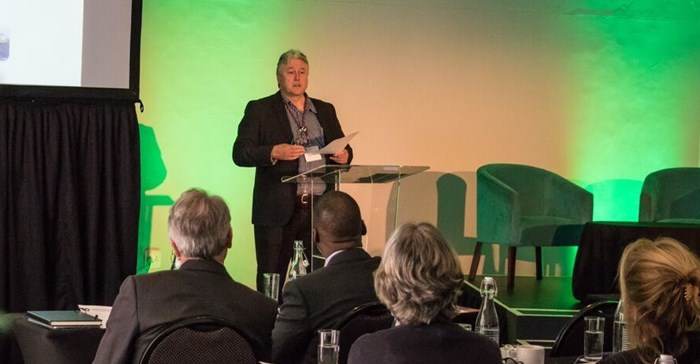Both South Africa and Mozambique show promise in the oil and gas sector, and collaboration between the two countries to create a substantial hub could significantly grow the region's economy, create jobs and boost other sectors such as logistics and tourism.

Niall Kramer, CEO: Saoga
Niall Kramer, CEO of the South African Oil and Gas Alliance (Saoga) told delegates at the inaugural conference he would be keen to seen development akin to the oil and gas operations in the North Sea, calling oil and gas “South Africa’s silver bullet for economic growth, jobs, and inequality and poverty reduction”.
However, he cautioned that although there is plenty of acreage that showed potential for oil and gas develeopment, nothing much is happening yet, largely due to policy uncertainty the Mineral and Petroleum Resources Development Act. “None of the A-list companies will do anything until the legislation is finalised.”
He believes that South Africa should transform into a gas-driven economy, with the potential for Mozambique and SA to collaborate and evolve into a vital global gas and services hub. “It feels to me we’re on the cusp. The future is clearly moving to gas. Renewables and gas are the way forward.”
Job creation
If South Africa and Mozambique partnered, the alliance could create millions of direct and indirect jobs for both countries. Cross-border collaboration is one of the best means of invigorating industrialisation to fuel job creation and thereby drive economic growth.
“South Africa first needs to focus on LNG imports, whilst exploring its drilling possibilities in parallel. In not doing so, we’re missing out on catalytic economic and job growth opportunities which will be mainly felt in the downstream economy. ENI in Mozambique has reached final investment decision for $7bn on Coral FLNG. That’s the kind of scale we want. It’s happy hour for gas globally – maybe until 2023. Let’s use that gap to begin imports.”
One of the biggest benefits to making the move to gas is the potential for job creation. According to Saoga figures gas creates 622, 000 direct jobs compared to coal's 154, 000, and 2.2m indirect jobs versus coal’s 400, 000. South Africa’s unemployment rate currently sits at 26.6%, making job growth pivotal to economic progression. Kramer says the move to gas could mean:
- Skills upgrades locally and nationally
- Infrastructure opportunities
- More connections to power
- Local supplier development fuelling SME growth
- A workforce upskilled for the ‘jobs of tomorrow’ with more artisans and technicians
- A pivot from mining skills to oil and gas capabilities
Kramer says that “all boats rise in a tide” and private-public partnerships will be key to fuel an economic upswing. Mozambique’s investment opportunities potentially offer significant returns down the full-value chain across multiple sectors including tourism, mining and energy as well as oil and gas.
Incentives for FDI
Tax and investment incentives are playing a significant role in attracting the FDI required to kick-start industrialisation. Lourenço Sambo, director general of APIEX Moçambique said his country is doing everything possible to make Mozambique attractive to investors.
“Mozambique’s development corridors aim to connect areas of trade and industry, which present further partnership opportunities for South Africa, especially with Mozambique’s current lack of – and pressing need for – infrastructure taken into account. The success of one industry prompts the growth of another. Mega-projects require extensive systems of complementary infrastructure, which should create vital job openings for South Africans and Mozambicans.”
With this comes a renewed focus and commitment from countries to upskill the existing workforce. This is critical at a time when technology and automation creep closer to threatening livelihoods, perpetuating an ongoing need for people to accrue diversified skill-sets that keep up with current demand.
For employment prospects to increase, SADC to strengthen, African businesses to grow, and economies to prosper, cross-border investments and partnerships between countries like Mozambique and South Africa will play an increasingly important role.





































